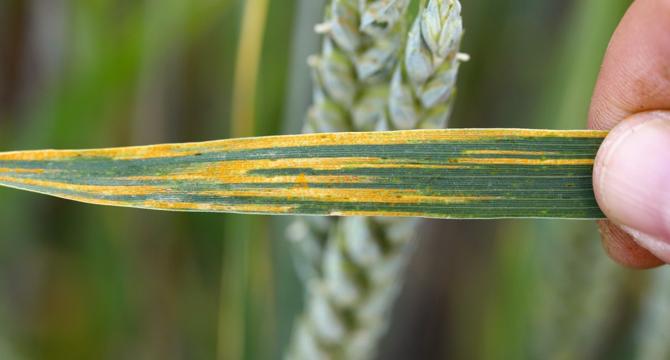TechnologyReview
1d
278

Image Credit: TechnologyReview
This international surveillance project aims to protect wheat from deadly diseases
- Wheat DEWAS, a global initiative of 23 international organizations led by Cornell University's Maricelis Acevedo and CIMMYT's Dave Hodson, targets to track wheat diseases and forecast potential outbreaks to governments and farmers in close to real-time to protect crops that supply roughly one-fifth of the world's calories. A mobile app enabled with AI to identify diseases by analyzing photos is under development to aid surveillance teams who survey wheat fields and input data on smartphones. Wheat DEWAS, also assisted by automated systems, models how fungal spores at a given site might spread under specific weather conditions, and a seven-day forecast bulletin is posted online daily. Wheat diseases like rusts are considered reemerging diseases in Europe, partly due to climate change.
- Wheat DEWAS operates on a global initiative involving 23 international organizations and aims to track wheat diseases to forecast potential disease outbreaks for close to real-time interventions. Wheat DEWAS scans wheat fields using teams of local pathologists who input the data on smartphones, and data collected is sent directly to the Global Rust Reference Center at Aarhus University. One of the apps under development for this project is intended to utilize AI algorithms to identify diseases by analyzing photos.
- Wheat DEWAS is developed as a system to protect wheat crops, which supply almost a fifth of the world’s required calories, from rusts. The system operates with the help of an automated technology designed to predict the spread of the fungus and provide accurate forecasts to potential targets, and the farmers and governments are given alerts if there is an impending problem so that measures can be taken before it is too late.
- Ethiopia, the largest wheat-producing country in sub-Saharan Africa, was hit by yellow rust that infected almost a third of its wheat in 2010. Wheat Disease Early Warning Advisory System (Wheat DEWAS) aims to provide targeted protection to a crop that provides around one - fifth of the world’s calories. Rusts have been reemerging diseases in Europe, with warmer than usual conditions making the crop even more vulnerable.
- Immediate risks are conveyed to farmers through SMS message alerts in Ethiopia, and other messaging alerts may be sent out too. The project is currently focused on eight countries in Africa and Asia, but researchers hope to have additional funding to expand the project beyond 2026 and increase the number of countries involved.
- The International team of 23 organizations led by Cornell University and the International Maize and Wheat Improvement Center (CIMMYT) has developed a new technology-assisted method to track wheat diseases and forecast potential outbreaks, all in close to real time. Wheat DEWAS is necessary to scan wheat fields across the eight focused Asian and African countries and mitigate crop losses from the spread of rust fungus, which has resurfaced due to climate change.
- Wheat DEWAS system utilizes various advanced technologies including mobile phone applications which can identify diseases through AI analysis of photos, and mini-gene sequencers such as the “Mobile and Real-Time Plant Disease” (MARPLE) – a gadget capable of carrying out real-time genes analysis of wheat sample to detect rust diseases within two days.
- Scientists at Wheat DEWAS are developing an AI-backed mobile phone app, designed specifically to aid teams of local pathologists in their surveillance of wheat fields, by helping in identifying and tracking new diseases swiftly, a critical element in the fight against wheat rust.
- According to Dagmar Hanold, Wheat DEWAS is doing vital work for global agriculture, and cereals, including wheat, are critical staples for people and animals worldwide. If these new pathogen combinations and gene-swapping occur often, it can lead to more aggressive strains.
- Wheat DEWAS warns that global wheat yields could drop up to 60%, which will likely lead to food price increases of up to 200%, causing a food crisis worldwide. The International Maize and Wheat Improvement Center(CIMMYT) projects that climate change-driven wheat rust outbreaks could spread from global wheat belts to new regions, including Europe, the US, and South America, making early detection even more necessary.
Read Full Article
16 Likes
For uninterrupted reading, download the app